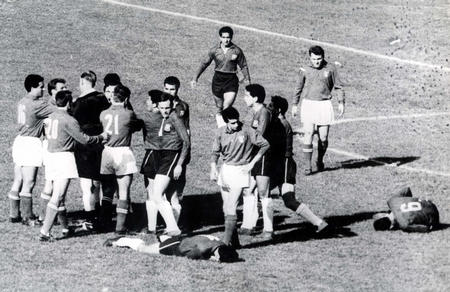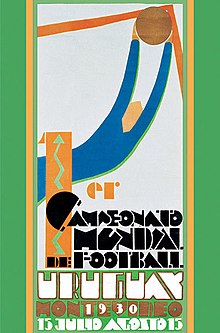
Back بوابة:كرة القدم Arabic بوابة:كرة القدم ARZ Portal:Futbol Azerbaijani Партал:Футбол Byelorussian Партал:Футбол BE-X-OLD Портал:Футбол Bulgarian প্রবেশদ্বার:ফুটবল Bengali/Bangla Portal:Nogomet BS Portal:Futbol Catalan دەروازە:تۆپی پێ CKB
| Main page | Categories & Topics | WikiProjects & Things you can do |
The Association football portal
Association football, more commonly known as football or soccer, is a team sport played between two teams of 11 players each, who almost exclusively use their feet to propel a ball around a rectangular field called a pitch. The objective of the game is to score more goals than the opposing team by moving the ball beyond the goal line into a rectangular-framed goal defended by the opposing team. Traditionally, the game has been played over two 45-minute halves, for a total match time of 90 minutes. With an estimated 250 million players active in over 200 countries and territories, it is the world's most popular sport.
The game of association football is played in accordance with the Laws of the Game, a set of rules that has been in effect since 1863 and maintained by the IFAB since 1886. The game is played with a football that is 68–70 cm (27–28 in) in circumference. The two teams compete to score goals by getting the ball into the other team's goal (between the posts, under the bar, and fully across the goal line). When the ball is in play, the players mainly use their feet, but may also use any other part of their body, such as their head, chest, and thighs, except for their hands or arms, to control, strike, or pass the ball. Only the goalkeepers may use their hands and arms, and that only within the penalty area. The team that has scored more goals at the end of the game is the winner. There are situations where a goal can be disallowed, such as an offside call or a foul in the build-up to the goal. Depending on the format of the competition, an equal number of goals scored may result in a draw being declared with 1 point awarded to each team, or the game goes into extra time or a penalty shoot-out.
Internationally, association football is governed by FIFA. Under FIFA, there are six continental confederations: AFC, CAF, CONCACAF, CONMEBOL, OFC, and UEFA. Of these confederations, CONMEBOL is the oldest one, being founded in 1916. National associations (e.g. The FA in England) are responsible for managing the game in their own countries both professionally and at an amateur level, and coordinating competitions in accordance with the Laws of the Game. (Full article...)
Selected article
With Malmö FF and AIK, IFK Göteborg are often considered part of the "Big Three" in Swedish club football, who have 43 championship titles between them. IFK is arguably the most successful club in Sweden, and perhaps in Scandinavia, as it is the only Scandinavian team to have won a European cup competition, the UEFA Cup; IFK won the Euro title in 1982 and 1987. They currently rank in the highest Swedish league, Allsvenskan, where they have played for the majority of their history. (Full article...)
Selected biography
He began his football career in 1997 with América Mineiro, where good form earned him a move to Atlético Mineiro in 2000. He became a star player for Atlético, playing for three years in the Brazilian Campeonato Brasileiro Série A. He came to particular prominence when he helped the Brazilian national team win the 2002 FIFA World Cup, playing in all seven of Brazil's matches.
In August 2002, for a fee of £4.5 million, he joined Arsenal with whom he won the 2004 FA Premier League, and two FA Cup trophies. In his first five seasons with the club he played 208 games and scored 23 goals, including scoring Arsenal's first competitive goal at the newly built Emirates Stadium on 19 August 2006. He was made vice-captain of Arsenal in 2006 and is contracted to the club until June 2009. In 2007 he was selected as Brazil captain for the Copa América tournament, which Brazil went on to win. (Full article...)
Selected association

The Oceania Football Confederation (OFC) is one of the six continental confederations of international association football. The OFC has 13 members, 11 of which are full members and two which are associate members not affiliated with FIFA. It promotes the game in Oceania and allows the member nations to qualify for the FIFA World Cup.
OFC is predominantly made up of island nations where association football is not the most popular sport, with low GDP and low population meaning very little money is generated by the OFC nations. The OFC has little influence in the wider football world, either in terms of international competition or as a source of players for high-profile club competitions. OFC is the only confederation to have not had at least one international title, the best result being Australia making the final of the 1997 FIFA Confederations Cup. (Full article...)
Did you know (auto-generated) -

- ... that Ryan Roberts, a defensive end for Notre Dame, was a soccer player in high school?
- ... that Ecuadorian footballer Hernán Galíndez won a bicycle for beating a team featuring Lionel Messi when they were children?
- ... that after his soccer career, Steve Palacios enlisted in the United States Army and played for the United States Armed Forces soccer team?
- ... that Carlton Town F.C., now competing at the eighth tier of the English football pyramid, was once denied promotion by a hat-trick scored by future England international Jamie Vardy?
- ... that Welsh footballer Jon Morgan went on to become a college principal after retiring?
- ... that goalkeeper Sophie Whitehouse, who has lived in England, Africa and the US, has been chosen to play soccer for the Republic of Ireland?
Selected image

Selected quote
General images -
Selected World Cup
The 1930 FIFA World Cup was the inaugural FIFA World Cup, the world championship for men's national football teams. It took place in Uruguay from 13 to 30 July 1930. FIFA, football's international governing body, selected Uruguay as the host nation, as the country would be celebrating the centenary of its first constitution and the Uruguay national football team had retained their football title at the 1928 Summer Olympics. All matches were played in the Uruguayan capital, Montevideo, the majority at the purpose built Estadio Centenario.
Thirteen teams (seven from South America, four from Europe, and two from North America) entered the tournament. Only a handful of European teams chose to participate because of the difficulty of traveling to South America due to the Great Depression. The teams were divided into four groups, with the winner of each group progressing to the semi-finals. The first two World Cup matches took place simultaneously and were won by France and the United States, who defeated Mexico 4–1 and Belgium 3–0, respectively. Lucien Laurent of France scored the first goal in World Cup history, while United States goalkeeper Jimmy Douglas posted the first clean sheet in the tournament the same day. (Full article...)
Selected topic
More did you know -
- ... that the 2008 FA Cup Final between Cardiff City and Portsmouth holds the record for the highest attendance for a football match at the new Wembley Stadium, with 89,874? (16 January 2021)
- ... that a team including bricklayers, assistant bank managers and insurance clerks defeated Coventry City in the third round of the FA Cup in 1989? (5 April 2021)
- ... that when Fred Stewart was appointed the manager of Cardiff City F.C., he paid the transfer fee of his first signing himself? (30 March 2021)
- ... that Manjappada, a supporters' group of Kerala Blasters FC, coordinated and brought forty-one busloads of their fans across Kerala to the venue for the opening match of the 2019–20 season? (26 January 2021)
- ... that Icelandic footballer Þórdís Hrönn Sigfúsdóttir has had to self-isolate on four occasions during the COVID-19 pandemic? (18 March 2021)
- ... that Blackpool became the most successful club in the history of English Football League play-offs when they won the 2017 EFL League Two play-off Final against Exeter City? (8 February 2021)
Association football portals
More sports portals
Associated Wikimedia
The following Wikimedia Foundation sister projects provide more on this subject:
-
Commons
Free media repository -
Wikibooks
Free textbooks and manuals -
Wikidata
Free knowledge base -
Wikinews
Free-content news -
Wikiquote
Collection of quotations -
Wikisource
Free-content library -
Wikiversity
Free learning tools -
Wiktionary
Dictionary and thesaurus





















































